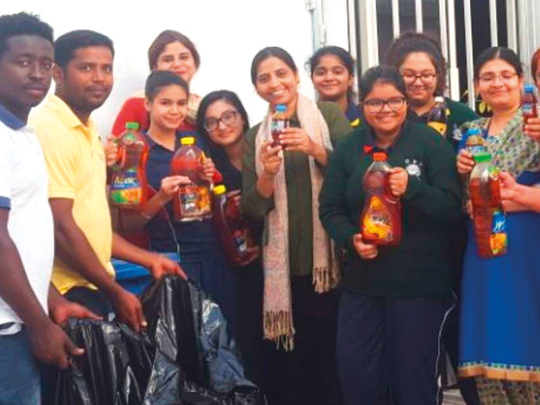
Sharjah: In November 2016, our school, Delhi Private School (DPS), launched an initiative to collect used cooking oil in collaboration with the Dubai-based waste management company, Blue. Thus far, we have collected 110 litres of waste oil and our efforts are ongoing.
The campaign continued to grow and the collection increased over the past year, due to the spread of awareness amongst students and families.
Blue, the waste management company, emphasised on how cooking oil should not be used more than three times, as it may adversely affect the health of the consumer, and should instead be recycled.
Their recycling process converts 70 per cent of the oil waste to clean water to be used for irrigation, a further 20 per cent is converted to fertiliser for farming and gardening with the final 10 per cent turned into a refined oil to be converted to environment-friendly biodiesel.
It is important to understand the benefits of this campaign. Pouring oil down the drain can damage your plumbing and pose a health hazard, as stated in the Japan-based Journal of Oleo Sciene. The oil sticks to the walls of the pipes, eventually choking drainage systems, posing plumbing challenges, in addition to safety and health hazards.
It can seep into the ground and aquatic bodies, choking marine life, birds and other organisms, as stated by the US-based Environmental Protection Agency (EPA). It can be toxic and form toxic products, destroy food supplies and habitats.
Beware of the health risks of reusing the oil for cooking. The Livestrong Foundation, a US-based nonprofit organisation, states that rancid oil contains free radicals, “molecules that can damage cells and lead to increased cancer risk, as well as affect the quality of your food”.
By changing the used oil’s chemical properties, it can be converted into a product that behaves like petroleum-based fuel, as stated by the US Energy Information Administration. The biodiesel created from the waste oil can be used in diesel-powered vehicles and is biodegradable. The glycerol separated in the process can also be turned into electricity.
Through our campaign, we initiated the process of spreading awareness by trying to educate people about the dangers.
Akshayaa Subbarayan, a pupil based in Sharjah, has been a participant of this campaign since the beginning. In the past year, she has alone collected 26 litres of used cooking oil and submitted it for recycling.
She said: “I believe even a small contribution might bring out a significant change in protecting the environment from various hazards.”
Gouri Sarswathy, a pupil based in Sharjah, has been collecting used oil from her neighbourhood.
She said: “Every Friday, after lunch, I visit my neighbours’ homes, where I keep bottles to collect used oil. In 2017, I collected 24 litres of it.”
Anjum Hasan, a teacher and the environment incharge at the school, believes this is a huge responsibility and it is best for us to understand it at a young age.
She said: “Any drive is student driven and result-oriented and not just an award or activity added to the calendar. Each member of our school today is conscious and makes an effort to do their bit.”
Khulood A. Rahman Hindiyeh, senior CSR specialist at Blue, congratulated our school for being an active participant in the initiative, and also informed us on what could be done to improve this campaign.
She said: “We collect the oil and recycle it into biodiesel, which is then used by our fleet to reduce our carbon emissions. Awareness can be spread through engaging students and their families in such initiatives, competitions and workshops. These initiatives aim at sending messages and awareness notes for students where it enhances their understanding and enthusiasm to protect the environment.”
The challenges in hand are spreading awareness, and trying to educate eateries to recycle the cooking oil, which is better for a safer environment. It seems that oil recycling is healthier for us as much as it is for the environment and by trying to recycle from restaurants and at a domestic level, we can add to our fuel resources, too.
— The reader is a student based in Sharjah.
Be a community reporter. Tell us what is happening in your community. Send us your videos and pictures at readers@gulfnews.com
FACTBOX:
Want to recycle used cooking oil at an individual level? Blue, the Dubai-based waste management company, might just have a solution for you by the end of this year.
When contacted to ask about recycling at the household level, Gulf News was informed that the company doesn’t offer the service at the moment, but the plans are in the pipeline.
Waseem Quraishi, head of the QHSE department at Blue, said: “Due to commercial aspects, it is not currently possible to recycle oil individually. But, when it comes to shopping centers, restaurants and public properties, we can do it. The total number of contracts currently stands between 300-350. But, if we consider their multiple outlets, then the numbers adds up to 5,000.
“All of them have been given barrels to collect the oil. Once it is filled, they let us know, we collect it and the oil is recycled. Anyone interested can come to us, discuss the plan and we’re willing to give them all the information. We have projects in the pipeline where we will approach the community. We’ll be placing barrels in different communities, this is a viable solution. This should be implemented by the end of the year.”







